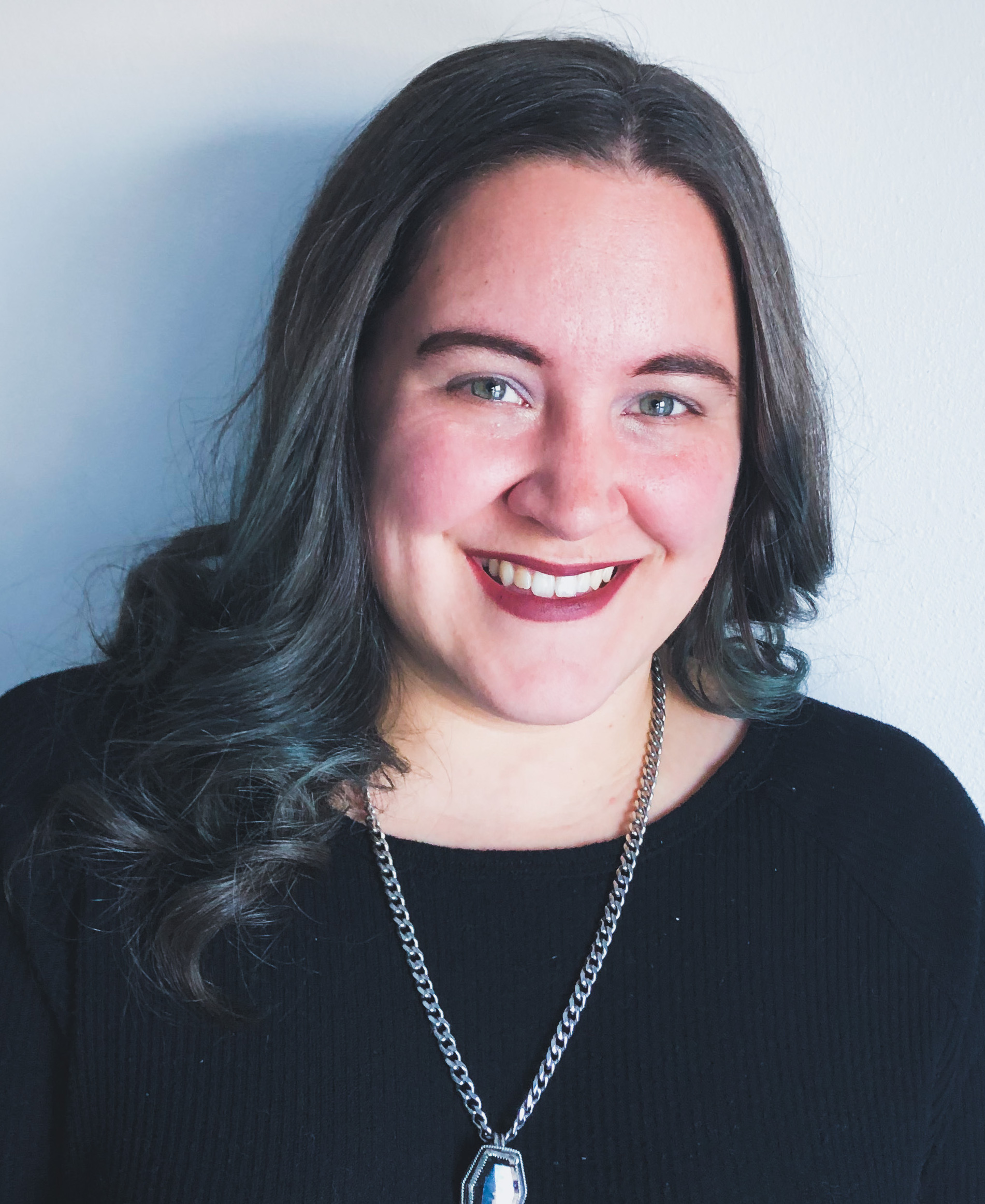"So many of us can’t look away from our phones and can’t stop scrolling, and I’ve been intrigued by our inability to look away from the internet — whether that’s a social media platform, email, breaking news topic, etc. With dating apps, people are hoping so hard for that perfect match, so they can’t stop swiping."
While many people are looking for love on dating apps, Katy Coduto is looking at the people who are looking for love.
And she's been amazed by what she's found.
"I was intrigued by the way my friends chose to swipe on people or not," Cudoto said. "There were profiles of people who I thought would make a great match for them that they showed no interest in, and I started to think about how this may play out over and over again for all kinds of people."

Coduto's interest in online dating, social media consumption, and all things love when it comes to the internet began during her undergraduate years at 91²Ö¿â earning a bachelor's degree in Electronic Media in 2013 and a master's degree in Media Management, Journalism and Mass Communication a year later.
"I started to get really interested in online relationships, and specifically interested in dating apps, when the dating app Tinder started taking off around 2014 to 2015," Coduto said. "It felt like the first app of its kind that a lot of my friends were downloading and trying; whereas previous options, like eHarmony or Match, had felt so serious.
"Tinder felt like a game, and I wasn’t sure how I felt about making relationships feel like a game!"
Curiosity Becomes Research
"I remember building MySpace profiles and chatting on AOL Instant Messenger, so I guess you could say I’ve been hooked for a long time when it comes to understanding the internet in broad terms," Coduto said.
After earning a Ph.D. in communication from Ohio State University in 2020, Coduto, who is originally from North Canton, OH, first taught communication and media studies at South Dakota State University before moving to her current role as an assistant professor of media science at Boston University.
When not in class, Coduto is likely conducting surveys, designing questionnaires or conducting in-depth, in-person interviews trying to learn more about what drives people to continue to seek love on their phones or computers. Going a step further, she also seeks to compare how people seek love with how they seek other interests online.

"My first test of this was with dating app users," Coduto said. "I then tried it with individuals who were watching breaking news. The next test of this area will be with true crime media. The thread of compulsive use strings them together, but the context shifts to make the various questions more manageable.
"I try to think through appropriate ways to narrow (topics) down and make them manageable in any given project. For instance, with my interest in compulsive internet use, I try to pick specific contexts where this might happen and test the behaviors in these contexts."
With each new step in her research, Coduto finds new questions in studying human behavior that changes as the technology advances.
"On a personal level, I feel like a sponge—I want to know as much as I can because it’s all wildly fascinating to me how people behave online."
Sexting Takes Center Stage
As Coduto's work progressed, her focus broadened to include the sharing of sexually explicit content between two people, known as "sexting." Who was most likely to engage in sexting? And why?
"It’s a practice that is mentioned often among online daters, and so I thought that made it worth further understanding," Coduto said. "It’s been quite the juicy topic to get into, too! People have a lot of feelings about it, whether they love it or hate it, trust it or think it's the riskiest behavior."
Beyond those who engage in or avoid sexting, a third group emerged -- those who sent unsolicited media to other people.
"I try to focus on either specific behaviors that I think might be worth understanding better or on outcomes of those behaviors that merit deeper understanding," Coduto said. "A really common behavior mentioned across both of these areas is the sending of unsolicited pictures, typically from men to women. I’ve been working on understanding a), the behavior itself, why someone would send an unsolicited picture to someone else, and b) the effects of that behavior, namely how someone feels when they receive such an image. (Sexting) is one area where it’s also really valuable to have more qualitative insights, including from interviews and open-ended survey questions."
"I have similar questions now for people who use dating apps or who post on Twitter or send unsolicited sexts—why are you showing off this part of yourself? Is this the real you? You could say my research journey has been a quest to understand the internet broadly and platforms specifically, with the ultimate aim of understanding people and their hunt for connection."
As online dating and sexting remain a high topic of debate and discussion, it's not surprising that Coduto's research is drawing quite a bit of media interest and requests for interviews.
"As I continue to work on studies related to sexting, I’m hoping to decrease some of the more negative experiences that people have talked about having," Coduto said. "Quite a few people have mentioned receiving unwanted photos, and I would love to be able to understand the full spectrum of that behavior to help limit it but to also give people the ability to talk about it.
"There is so much focus on consent when it comes to in-person sexual communication and contact, but it’s really important to extend that to digital practices as well. This work is also helping me to think more deeply about revenge porn and its negative impacts, and I’m hoping to start a project that focuses on this more specifically in the new year."
Compulsion Cannot Be Overlooked
Coduto admits her expectations have changed over time, often leading to more questions to investigate which drives her to continue her research.
Those with addictions or compulsions to online dating or sexting, for example, mandate additional research.
"I found that individuals who experienced social anxiety and loneliness were the most likely to compulsively use dating applications," Coduto said. "This was pretty much exactly what I was expecting. My theory was that if you’re anxious about in-person social interaction, dating apps give you a safe place to communicate and connect with potential partners. If you’re lonely, it may make those online platforms that much more appealing. That was exactly what we saw."
The pandemic has created yet another contributing factor to online dating, specifically how those seeking relationships would react to limitations placed on in-person interactions.
"A colleague and I investigated dating app use at the start of COVID-19," Coduto said. "We suspected that people would be using apps heavily in those early days when lockdowns were nearly everywhere. We also saw this play out.
"We found that men were more likely to be willing to meet offline at the start of COVID—when so little was known—compared to women, who were thinking more about putting time in to get to know someone. Men were basically willing to risk COVID-19 infection if they found a match they thought was worth it, which was so wild to me."
"We also did research into if online daters were sexting during COVID-19. Again, we figured that people were stuck at home and (maybe) not meeting in person, so sexting might replace some of that in-person physical connection. We saw that people who were looking for casual relationships were much more likely to sext with an online dating partner, whereas people looking for serious relationships really wanted to focus on getting to know another person."
The Professor Who Changed Her Career Path
Coduto thinks back to her early years at 91²Ö¿â when she first saw the potential for Facebook, Twitter, Snapchat and other platforms in broadening the communications field. As a member of student media, she said she was always thinking about how to better promote her organization's channels.
Having switched he major from magazine journalism to electronic media, Coduto admits she had an "inkling" that electronic media was not just her passion but was likely becoming her future.
That's when a single class and professor convinced Coduto that research was her calling.
"I would say I started to really consider some of the specific research questions I have now when I was a sophomore," she said. "Most people who know me know that Dr. Danielle Coombs’s research methods in advertising class is what changed the trajectory of my whole career. Doing research in that class was so satisfying, and it’s the reason I stayed at 91²Ö¿â for my master’s degree in media management. I took that class and basically wanted to know how I could do that forever, and now I do!"
Coombs came to 91²Ö¿â in 2007 and teaches research methods in 91²Ö¿â's School of Media and Journalism. She is also an author, media commentator, and consultant on areas related to sports, politics, and politics of sport.

"I loved my time at 91²Ö¿â! I’m grateful for the experiences I had as both an undergraduate student and a master’s student. The mentorship I received in the classroom and in student media was top-notch. I always recognize 91²Ö¿â as the place that helped me find my interest in research, but I also try to emulate the professors I had when I teach now.
The Student is Now the Teacher
While research remains Coduto's passion, teaching continues to be her calling.
"I’m glad I get to teach in addition to research, as I feel that my students are the first people I can positively influence to think about how they engage with social media and other online platforms," she said. "It’s also why I try to share my research with media outlets—the more people who can critically think, even for five minutes, about how much they use the internet and why seems like a good thing to me. It might not change their behavior right away, but reflection is a stepping stone."

